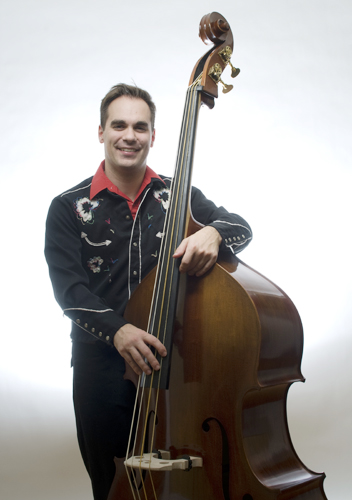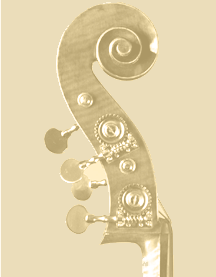Rockabilly Bass, Joe Fick
We are proud to introduce one of the world's best Rockabilly bass
players, Mr. Joe Fick. Otherwise known as "Slick
Joe Fick".
 Joe
also plays on a Thompson RM-100 bass. In his
Rockabilly bass video, he plays the RM-100 model in the blonde
finish, which are still the same price as any Standard model, for
$1,435. In this video, he plays on Lenzner gut strings. Joe
also plays on a Thompson RM-100 bass. In his
Rockabilly bass video, he plays the RM-100 model in the blonde
finish, which are still the same price as any Standard model, for
$1,435. In this video, he plays on Lenzner gut strings.
While Joe is quite arguably one of the best Rockabilly bass
players in the world. He comes from a musical background, but not
the typical path that one would imagine. Joe's brother, David,
teaches Music Theory at the Thorton Music School at USC and his
sister, Kim, plays violin in the Fort Worth Symphony. Joe
humorously proclaims himself as the 'family screw-up' (because he
didn't pursue a classical career). We whole heartedly disagree
with him on that one and his musical roots are well developed.
Initially from Tacoma, WA, Joe started with Suzuki Violin at a very
early age. Joe learned what a pulse (and groove) is at
a very early age! There's still hope that both his sister and
brother come to their senses and at least learn some Rockabilly...
All joking aside, Joe is one serious player. Joe has been living in
Memphis for the last eleven years and as of late resides in
Nashville is the member of the Dempseys band and often
free lances with other groups throughout the region.
Here's how Joe describes his musical background and how he got
into Rockabilly Bass:
"Following in the musical footsteps of my two older siblings, I
took an interest in classical music at a very young age and began
private violin lessons at age five. It was around this time that I
met who I often refer to as “my best friend in the whole wide world”
Bradley Dean Birkedahl. Though stylistically our musical tastes
differed (Brad being a huge Elvis Presley fan), we both desired to
play music and eventually began playing together. Throughout
elementary school I “fiddled about” with the violin, piano, cello,
and the acoustic guitar and listened to a wide array of musical
styles including big band jazz, classical, pop, and punk rock from
older sister’s record collection.
By Jr. high school Brad and I were taking guitar lessons
together from local guitarist/bassist Steve Woolsey and had formed a
band with former drummer Mike Moffitt called The Dempseys (named
after our eighth grade English teacher Howard Dempsey who resembles
Ted Koppel from ABC’s Niteline). Brad and I were guitarists and we
were in search of someone to play the thankless role of “bassist.”
My knowledge of bass players at this time was somebody like John
Paul Jones who stood in the back and was overshadowed by his musical
counterparts. I decided to be the sacrificial lamb and switch to
bass in order to get the ball rolling and the band gigging, not to
mention Brad was a much better player than I was so it seemed like
the right decision. My logic told me if I could fake my way through
six strings then four strings was going to be more practical and
manageable and I would have a fighting chance.
My first electric bass was an Ibanez Roadstar 2 that I
bought used. It had a P Bass shape, two pickups, and was red with a
white pickguard and I played it with a giant triangular bass pick.
By the time I was fifteen our band was playing wherever we could
find people to listen including the school cafeteria, coffee shops,
and street markets. Most of these gigs were stripped down and
acoustic in order not to drive people off and many were outdoor
without the use of amplification. This setback gave me the idea for
the upright bass. If we were playing mostly acoustic then all I
would need is the bass; no amp, no power, no problem (well, maybe
transportation), plus it looked really cool. My mom called music
stores around town inquiring about upright basses and found a dealer
just north of Tacoma in Des Moines called Hammond Ashley. It was
there that we rented an old plywood Kay Bass which we ended up
buying later. It was sunburst and sounded really full for an
acoustic instrument. Over the next few months I played that bass
constantly getting my fair share of blood blisters and torn skin but
realizing that there was no going back to the electric bass; if I
was going to excel at this instrument then I would have to overlook
the pain that my hands went through and the awkwardness and size of
the instrument. Soundwise, however, the “new addition” to the band
fit like a glove."
I now use and play my new
Thompson RM-100 bass and I am ecstatic to own such a great bass.
It has the power and sustain that one would only come to expect in a
great plywood bass and the workmanship on my Thompson is flawless.
I love this bass!
About Joe's set up: On the video, Joe plays on a very
simple setup with the Standard, RM-100 (blonde) model and uses the
straight gut strings by Lenzner. (Lenzner are the
old pros at making the worlds best gut strings. (It is most likely,
though they don't advertise it, make all the other very expensive
gut strings for other leading brands headquartered in Germany and
throughout Europe.) There were just a couple of marginal
differences in his set up: The strings are set just a tad higher to
facilitate the slap bass technique. Strings that are too low,
are not easy to reach under. The G was set at about 7mm and
the E string about 9mm.
'Slick' Joe Fick is anything but slick. A true musician in
the fullest meaning of the word and we're proud that that he uses a
Thompson bass!
Got a question about any of our rockabilly bass set ups? Give us a
call (800-600-2689) or
email Steve.
| |
 |
 |
|


